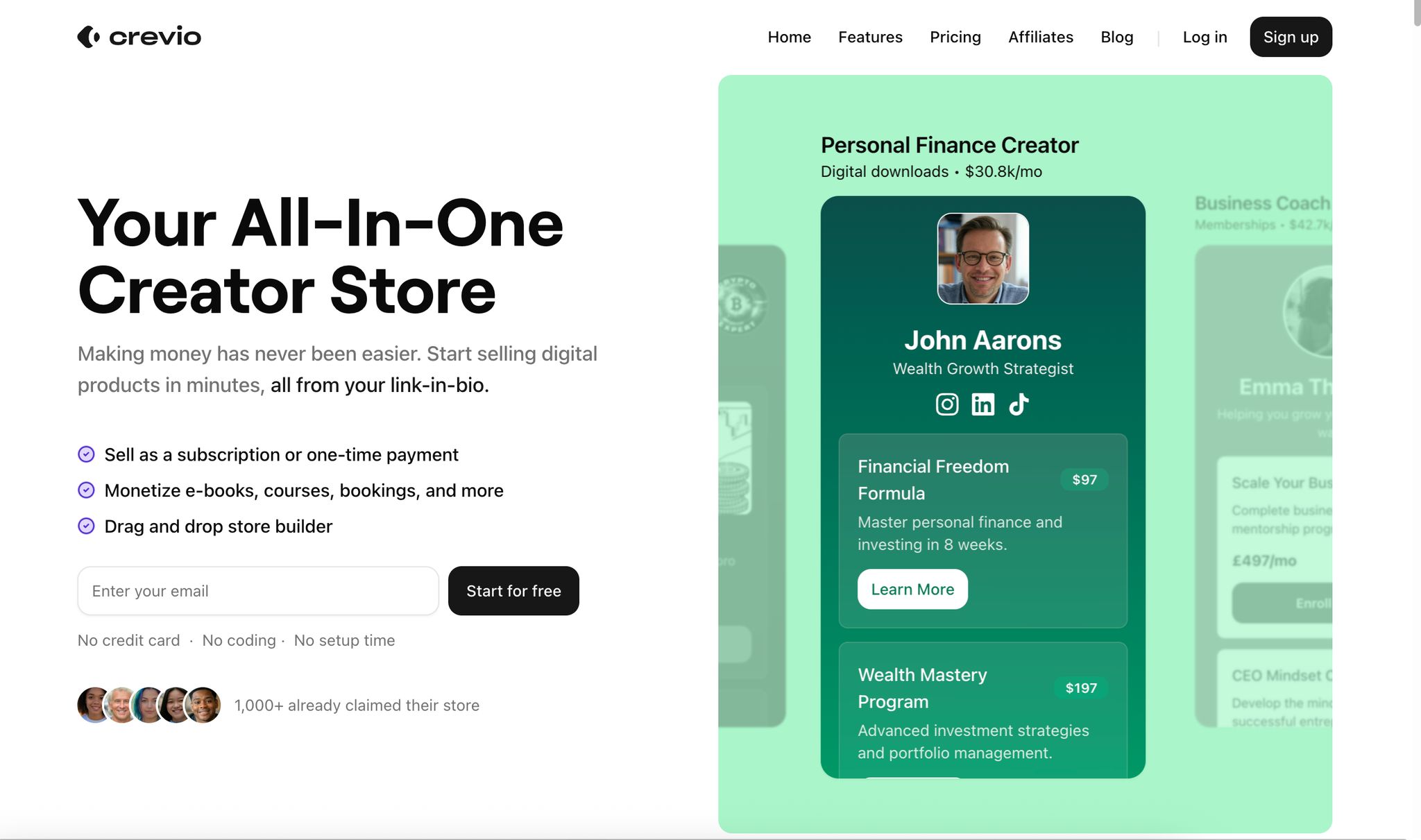What Is an Infopreneur? Here’s How To Become One

An infopreneur is someone who turns their knowledge into digital products like eBooks, online courses, or webinars to sell online. This business model is cost-effective, scalable, and allows you to work from anywhere.
Here’s how to get started:
- Identify Your Expertise: Focus on what you know well and solve specific problems for your audience.
- Create Digital Products: Start with eBooks, courses, or subscription-based content.
- Set Up an Online Store: Use platforms like Crevio to sell your products.
- Market Your Business: Build an email list, share valuable content, and promote through social media.
Why Infopreneurship Works:
- Low Cost: No inventory or shipping required.
- Global Reach: Sell to anyone, anywhere.
- Passive Income: Sell digital products repeatedly with minimal effort.
Tools You’ll Need: Writing software, design tools like Canva, and platforms like Crevio for selling and managing your products.
Start small, focus on solving real problems, and scale as you grow your audience.
Common Information Products
eBooks and Digital Downloads
Digital downloads are a popular starting point for many infopreneurs because they’re straightforward to create and appeal to a wide audience. eBooks, for instance, are often priced between a few dollars and $50. Specialized guides aimed at technical or professional audiences can be priced even higher. Once completed, these products can generate passive income with minimal ongoing effort. To make your eBook stand out, focus on solving specific problems. For example, instead of a broad topic like "Guide to Digital Marketing", try creating niche resources such as "Instagram Story Templates for Real Estate Agents" or "30-Day Content Calendar for Health Coaches."
Teaching Through Courses
Online courses are one of the most profitable types of information products, with prices typically ranging from $30 to $2,000. While creating a course requires more upfront work, the effort pays off by allowing you to deliver detailed solutions and charge premium prices.
Subscription-Based Content
Membership sites offer the advantage of steady, recurring income. Subscriptions usually range from $8.33 to $100 per month (or $100 to $1,200 annually). Although this model demands ongoing content creation, it provides a predictable revenue stream.
"A Great InfoProduct is an information product that provides a process and tools for the customer to address a struggle, to transform from a state A to a state B." – structurinfo.com
To succeed with subscription-based content, focus on delivering consistent value by:
- Providing Regular Updates: Keep members engaged with fresh content like monthly masterclasses, templates, or interviews.
- Creating Clear Learning Paths: Organize content in a way that helps members work toward specific goals step by step.
- Building Community: Foster interaction among members through discussion forums or accountability groups to create a sense of belonging.
Smaller, targeted offerings are becoming increasingly popular. Instead of overwhelming subscribers with too much content, focus on actionable steps and tools that help them achieve measurable results. Each of these product types opens up a unique way to generate income, laying the groundwork for practical strategies to follow.
4 Steps to Start as an Infopreneur
Ready to dive into infopreneurship? These steps will take you from identifying your expertise to launching your first digital product.
Find Your Knowledge Area
Start by pinpointing the skills or knowledge others would pay for. Focus on topics you’re passionate about and have proven success in.
Here’s how you can validate your expertise:
- Write down skills where you excel.
- Identify problems you’ve successfully solved.
- Look for gaps in industry knowledge.
- Survey potential customers to understand their challenges.
For example, if you’re a fitness trainer with experience in postpartum recovery, you could create tailored programs for new mothers.
Design Your First Product
Your product should solve a specific problem for your audience. Keep it practical and easy to follow by including:
- Clear learning outcomes.
- Step-by-step instructions.
- Supporting tools like worksheets or templates.
- Real-world examples to illustrate your points.
The goal is to make your product actionable and useful.
Set Up Your Online Store
Your online store is your digital storefront. It should highlight your expertise and make purchasing effortless. Include:
- An About page showcasing your credentials.
- Clear product descriptions with transparent pricing.
- Secure payment options.
- A mobile-friendly design.
- Email signup forms to grow your audience.
Once your store is set up, shift your focus to marketing and building customer relationships.
Launch Your Marketing Plan
With your product and store ready, it’s time to connect with your target audience through a solid marketing plan.
Here’s where to start:
- Build an Email List
Offer a free resource (like an ebook or mini-course) to encourage signups. - Showcase Your Expertise
Share your knowledge by:- Writing guest posts for industry blogs.
- Appearing on podcasts.
- Posting valuable content on social media.
- Hosting free workshops or webinars.
- Create a Content Calendar
Organize your content strategy to stay consistent. As Amy Kenly, vice president of marketing at The Launch Box, explains:
"Right from the start, we focus on website SEO and establish baseline metrics for organic visitors, bounce rates, session duration, and returning users".
"Marketing should follow the sales funnel: utilize SEO or social advertisements to get people’s attention (awareness), give free resources like e-books to keep them engaged (interest), and use email or remarketing ads to inspire them to buy (intent/purchase). Stay in contact with useful updates to foster loyalty following purchases. The secret is to keep things basic, monitor your development, and concentrate on what works." – Georgi Todorov, founder of Create & Grow
Track your progress by monitoring:
- Email open rates.
- Website traffic.
- Social media interactions.
- Sales conversions.
- Feedback from your customers.
These metrics will help you refine your approach and grow your business.
Required Tools for Infopreneurs
To succeed as an infopreneur, having the right tools is essential for creating, selling, and managing digital products efficiently.
Content Production Software
Create high-quality content with reliable tools:
- Writing Tools: Use Microsoft Word or Google Docs to draft ebooks and course materials.
- Design Software: Canva or Adobe Creative Suite can help you craft visually appealing designs.
- Screen Recording Tools: OBS Studio or Loom are great for recording video tutorials.
- Audio Gear: Invest in a good microphone like the Blue Yeti ($129.99) for clear and professional audio.
Choose tools that match the format of your content. Once your content is ready, you’ll need a platform to sell and manage it.
Crevio: Digital Product Sales Platform
 Crevio is a one-stop solution for selling and delivering digital products. Here’s a comparison of its plans:
Crevio is a one-stop solution for selling and delivering digital products. Here’s a comparison of its plans:
| Feature | Basic Plan ($29/month) | Growth Plan ($89/month) |
|---|---|---|
| Transaction Fees | 0% | 0% |
| Products Limit | 5 published | Unlimited |
| Admin Seats | 5 | Unlimited |
| Custom Domain | No | Yes |
| Branding Options | Standard | Custom |
The platform supports various content formats and offers flexible payment options, including one-time purchases and subscriptions. You retain full ownership of customer data and can customize your store with mobile-friendly designs and branding options.
Marketing and Data Tools
Pair your sales platform with marketing and analytics tools to grow your audience and improve performance:
- Email Marketing Tools: Keep customers engaged and informed about new products.
- Analytics Software: Track website traffic and sales trends to make data-driven decisions.
- Social Media Management Tools: Schedule posts consistently across platforms.
- SEO Tools: Boost your content’s visibility on search engines.
Look for tools that integrate seamlessly with your sales platform and streamline repetitive tasks. This lets you focus on creating content that resonates with your audience.
Ways to Expand Your Business
Grow Your Customer Base
Building a successful infopreneur business often begins with smart email marketing. Many infopreneurs have seen impressive results – some even reaching six-figure monthly earnings – by using well-planned email campaigns and lead magnets.
Here are some tips to grow your email list:
- Offer targeted lead magnets that address specific challenges.
- Create landing pages designed to convert visitors into subscribers.
- Monitor performance metrics like conversion rates and engagement.
Work with Other Creators
Expanding your audience often means working with others in your niche. Collaborative efforts can lead to mutual growth. Consider these approaches:
- Guest appearances on podcasts or participation in virtual summits.
- Develop co-branded products with creators who complement your expertise.
- Cross-promote by sharing each other’s content or services.
For example, newsletter referral programs have helped creators grow their email lists by 35%. Strategic collaborations can open doors to new audiences while strengthening your brand.
Use Time-Saving Tools
Once your marketing is set, automation tools can help you manage daily tasks more efficiently. Here’s how to streamline your workflow:
| Task Category | Recommended Tools | Benefits |
|---|---|---|
| Content Creation | Templates, Batch Processing | Cuts down repetitive tasks |
| Social Media | Buffer, Hootsuite | Simplifies scheduling |
| Customer Management | HubSpot CRM | Organizes communication |
| Task Management | Trello, Asana | Keeps workflows on track |
"As solo or small-team business owners, managing many tasks daily makes saving time crucial!" – Michelle Pontvert
Use email templates for customer support and onboarding, and block specific days for meetings to maintain focus. Some infopreneurs have scaled to six-figure businesses while working less than 10 hours a week by relying on automation.
For instance, Crevio’s automation tools handle tasks like digital product delivery and payment processing, freeing you to focus on creating content and engaging with your audience. Their Growth plan, which includes unlimited products and admin seats, makes scaling your business smoother.
Next Steps
Ready to kick off your infopreneur journey? Here’s a step-by-step plan to help you launch your digital product business:
| Phase | Action Items | Timeline |
|---|---|---|
| Research | Find your niche and understand what your audience needs | Week 1-2 |
| Planning | Decide on your product type and map out your content | Week 2-3 |
| Creation | Build your first digital product | Week 3-6 |
| Launch | Set up your store and start marketing | Week 6-8 |
Use this timeline as your guide to move forward with purpose.
As you dive into research and planning, choose a niche that aligns with both your interests and expertise. Focus on solving specific problems for your audience to create a product that truly resonates.
"Entrepreneurship is a dynamic journey, and continuous learning, flexibility, and perseverance are essential in navigating challenges and achieving sustainable growth." – Calvin Knowlton, PhD
Get started quickly with Crevio’s Basic plan to launch your business. Once your foundation is set, prioritize creating high-quality, focused content. Crevio’s customizable branding options will help you maintain a polished and consistent presence across all platforms.
From day one, keep an eye on your performance metrics. Successful infopreneurs pay close attention to customer feedback and engagement to improve their offerings. Begin with Crevio’s Basic plan and scale up as your business grows.
Take the first step today and start building your infopreneur business with confidence!






